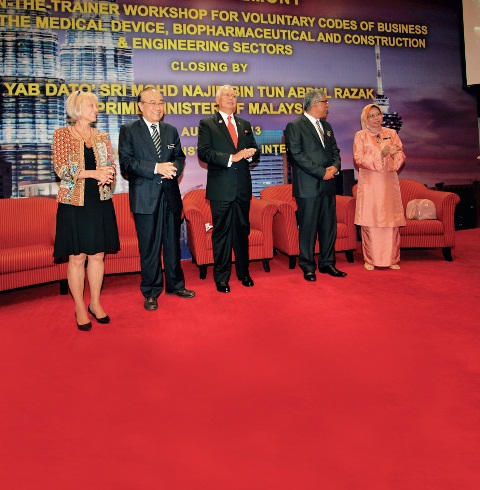This post is brought to you by the National Key Results Areas (NKRA).

An associate justice of the United States Supreme Court, Potter Stewart, once said that “Ethics is knowing the difference between what you have a right to do and what is right to do.” Sadly, in the business world, a very thin line separates the two, and often, moral codes get lost in an individual’s quest to become the best.
Malaysian Small and Medium Enterprises (SMEs) have been at the forefront of local economic development, even before the country achieved independence and over the years, efforts have been taken to ensure the success of this sector. As the engine of economic growth that can serve as the key driver in global economic recovery, it is essential for the SMEs to operate and innovate in open and ethical business environments.
Businesses have great potential to transform people’s lives and to alleviate poverty through generating economic growth. It is imperative that fair business ethics are practiced. Business ethics are moral principles that guide the way a business behaves. Acting in an ethical way involves distinguishing between right and wrong and then making the right choice.
Unethical behaviour will have negative impacts on inflation, decrease GDP, cause currency depreciation, reduce foreign investment and undermine health systems. In addition, unethical behaviour hurts individual businesses because it increases the costs of doing business through bribes and penalties, lowers sales growth and productivity, lowers the ability of investments to penetrate new markets, as well as undermines a company’s financial growth over the long term. Corruption is one problem that plagues the business environment of any nation, and in Malaysia new laws and actions have been introduced to eradicate the problem.
Asia-Pacific Economic Co-operation (APEC) Secretariat Lynn A. Costa said the organisation is trying to raise the awareness to change the culture of corruption to protect SMEs because they are the drivers of innovation. She also added that in 2011, many SME entrepreneurs cited corruption as a deterrent for export, especially small companies that did not have much financial bandwidth.
“The World Bank estimates that almost 25 per cent of the SMEs’ operating capital can go to paying bribes and they just do not have the money,” said Costa. As the advisor to the United States Department of Commerce, Costa said that eliminating corruption should be the main priority because it is the consumers and the public that is really getting harmed.
According to the World Bank Institute, more than $1 trillion US dollars are paid in bribes every year. This means that each year, the cost of corrupt activities is equal to 3 per cent of the world’s GDP. The global economy has shifted the power to impact the world in a lasting way from governments to multinational companies. Developing countries are eager to form partnerships with these global giants and are willing to conform to new requirements. By refusing to deal with countries or businesses who engage in unethical practices, these companies can have a real effect on introducing common ethical standards for businesses across the world.
APEC’s emphasis on Voluntary Codes of Business Ethics benefits APEC member economies by providing a platform for effective industry self-regulation and it supports enforcement efforts as well. For businesses especially SMEs, these Voluntary Codes of Business Ethics provides companies with greater clarity and harmonisation in rules and practices, allowing companies to access new APEC markets through lower compliance costs.
For this reason, Costa explained that it is essential to equip industry players with a full range of knowledge on Ethics Compliance. All members of the APEC association must adhere to the Code of Ethics. “As a member you would have to accept the Code Ethics and cannot violate it. If you do, you’d be booted out of the association,” she said. The Code of Ethics is one of the anti-corruption tools that are needed to control the behaviour of employees so that whenever they conduct their businesses, they will not resort to bribery and corruption.
In line with this, the Business Ethics for APEC SMEs Initiative held its largest programme to date last month. Hosted by the Malaysian Anti-Corruption Commission at its academy, the initiative brought together industry and government representatives to establish a network of ethics trainers, spanning all 24 APEC and ASEAN economies, in the medical device, biopharmaceutical, and construction & engineering sectors. The APEC Train-the- Trainer Workshop follows three years of intensive activities to draft and adopt APEC Principles for Codes of Business Ethics for the three sectors, as well as their implementation.
Global economy will operate regardless of the ethical environment and there is at least as much opportunity for promoting unethical practice as there is the chance to change for the better. It is the consumer, business owner and shareholder who have the power to insist on change.
————————————————————————————————
For more information, please visit www.nkracorruption.gov.my
Source: The Expat October 2013
What are your thoughts on this article? Let us know by commenting below.No registration needed.
Read more:
"ExpatGo welcomes and encourages comments, input, and divergent opinions. However, we kindly request that you use suitable language in your comments, and refrain from any sort of personal attack, hate speech, or disparaging rhetoric. Comments not in line with this are subject to removal from the site. "
















